Reflective Learning, Expectations in Business Management Degree
VerifiedAdded on 2023/06/18
|7
|2317
|279
Essay
AI Summary
This essay discusses the significance of reflective learning in business and management education, emphasizing its role in enhancing critical thinking and future performance through the analysis of past experiences. It uses Gibbs' reflective cycle to illustrate the learning process, highlighting the importance of formative and summative feedback in identifying learning needs and strengthening understanding. The essay also addresses the cultural and behavioral expectations for business and management students, focusing on the need for respectful and inclusive learning environments. Furthermore, it underscores the value of peer-to-peer support and teamwork in developing communication, collaboration, and problem-solving skills, preparing students for their future careers by fostering an environment where diverse perspectives are valued and respected.
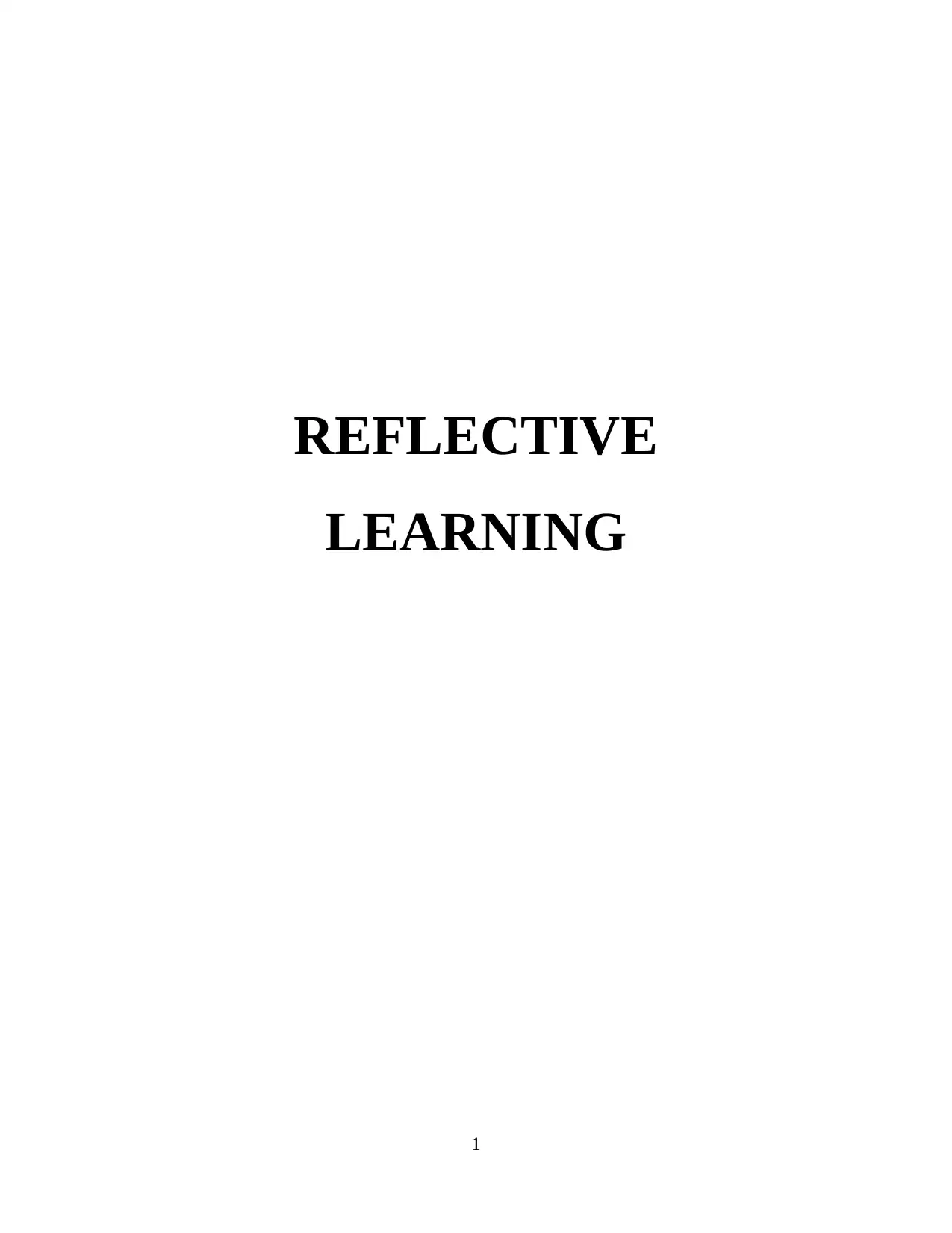
REFLECTIVE
LEARNING
1
LEARNING
1
Paraphrase This Document
Need a fresh take? Get an instant paraphrase of this document with our AI Paraphraser
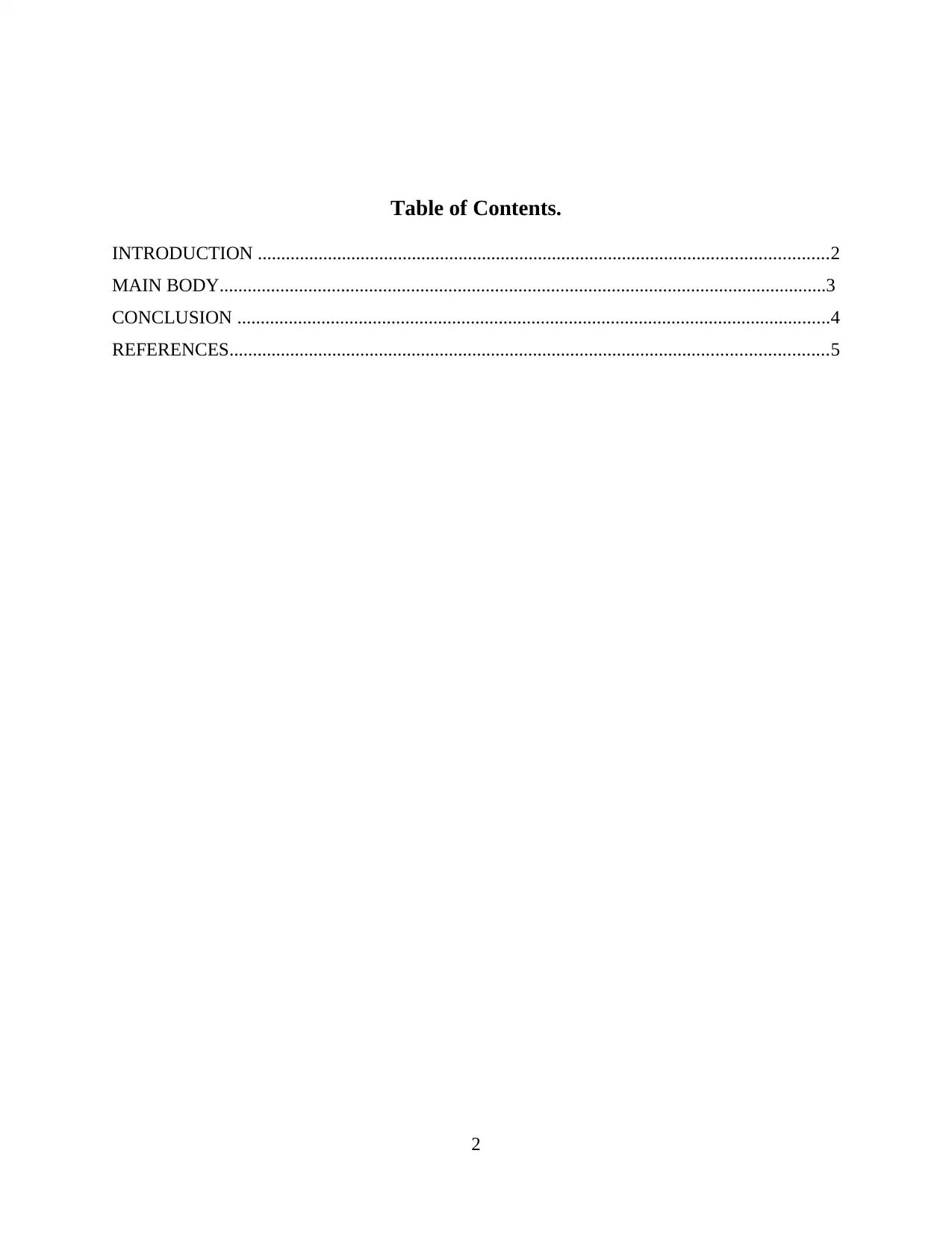
Table of Contents.
INTRODUCTION ..........................................................................................................................2
MAIN BODY..................................................................................................................................3
CONCLUSION ...............................................................................................................................4
REFERENCES................................................................................................................................5
2
INTRODUCTION ..........................................................................................................................2
MAIN BODY..................................................................................................................................3
CONCLUSION ...............................................................................................................................4
REFERENCES................................................................................................................................5
2
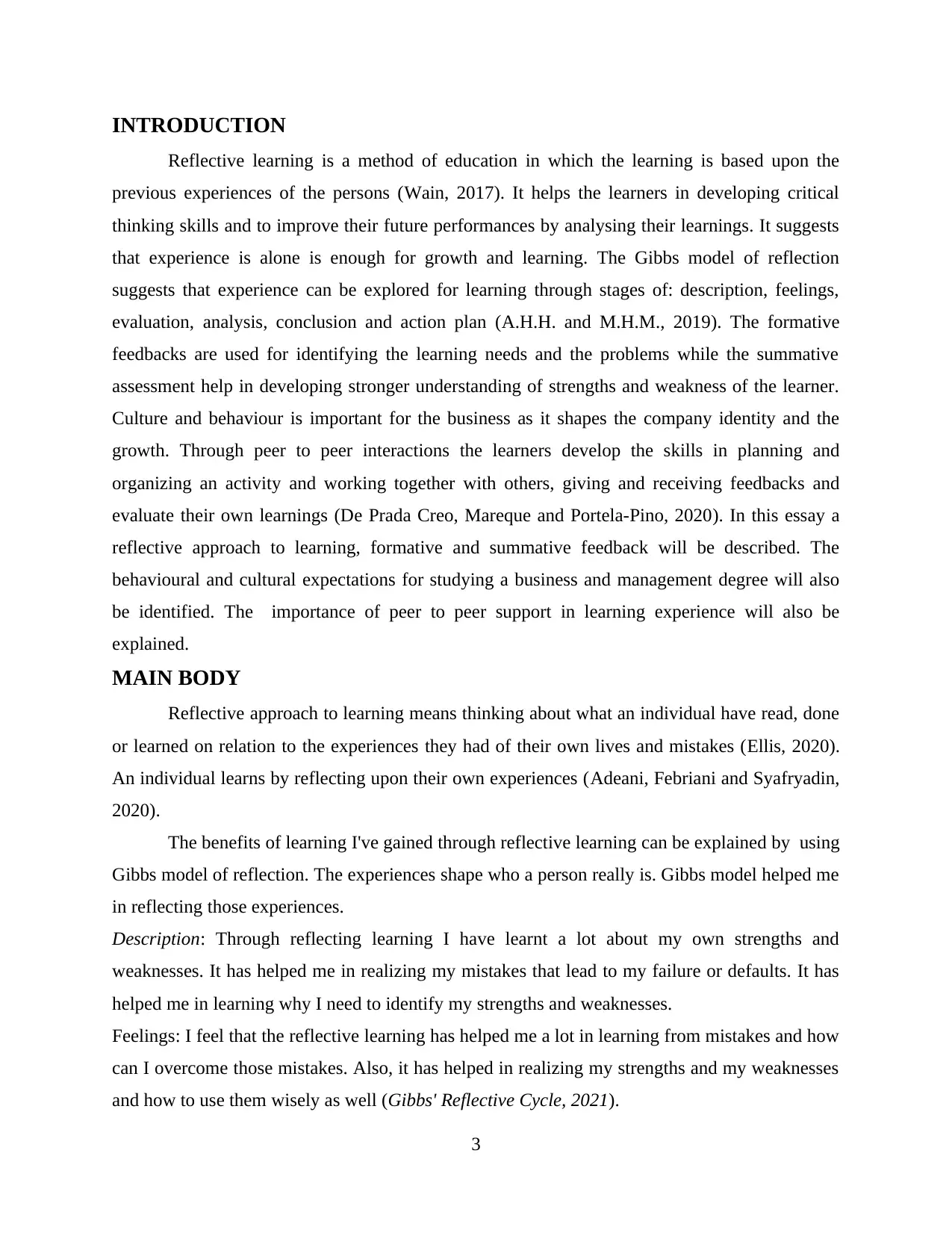
INTRODUCTION
Reflective learning is a method of education in which the learning is based upon the
previous experiences of the persons (Wain, 2017). It helps the learners in developing critical
thinking skills and to improve their future performances by analysing their learnings. It suggests
that experience is alone is enough for growth and learning. The Gibbs model of reflection
suggests that experience can be explored for learning through stages of: description, feelings,
evaluation, analysis, conclusion and action plan (A.H.H. and M.H.M., 2019). The formative
feedbacks are used for identifying the learning needs and the problems while the summative
assessment help in developing stronger understanding of strengths and weakness of the learner.
Culture and behaviour is important for the business as it shapes the company identity and the
growth. Through peer to peer interactions the learners develop the skills in planning and
organizing an activity and working together with others, giving and receiving feedbacks and
evaluate their own learnings (De Prada Creo, Mareque and Portela-Pino, 2020). In this essay a
reflective approach to learning, formative and summative feedback will be described. The
behavioural and cultural expectations for studying a business and management degree will also
be identified. The importance of peer to peer support in learning experience will also be
explained.
MAIN BODY
Reflective approach to learning means thinking about what an individual have read, done
or learned on relation to the experiences they had of their own lives and mistakes (Ellis, 2020).
An individual learns by reflecting upon their own experiences (Adeani, Febriani and Syafryadin,
2020).
The benefits of learning I've gained through reflective learning can be explained by using
Gibbs model of reflection. The experiences shape who a person really is. Gibbs model helped me
in reflecting those experiences.
Description: Through reflecting learning I have learnt a lot about my own strengths and
weaknesses. It has helped me in realizing my mistakes that lead to my failure or defaults. It has
helped me in learning why I need to identify my strengths and weaknesses.
Feelings: I feel that the reflective learning has helped me a lot in learning from mistakes and how
can I overcome those mistakes. Also, it has helped in realizing my strengths and my weaknesses
and how to use them wisely as well (Gibbs' Reflective Cycle, 2021).
3
Reflective learning is a method of education in which the learning is based upon the
previous experiences of the persons (Wain, 2017). It helps the learners in developing critical
thinking skills and to improve their future performances by analysing their learnings. It suggests
that experience is alone is enough for growth and learning. The Gibbs model of reflection
suggests that experience can be explored for learning through stages of: description, feelings,
evaluation, analysis, conclusion and action plan (A.H.H. and M.H.M., 2019). The formative
feedbacks are used for identifying the learning needs and the problems while the summative
assessment help in developing stronger understanding of strengths and weakness of the learner.
Culture and behaviour is important for the business as it shapes the company identity and the
growth. Through peer to peer interactions the learners develop the skills in planning and
organizing an activity and working together with others, giving and receiving feedbacks and
evaluate their own learnings (De Prada Creo, Mareque and Portela-Pino, 2020). In this essay a
reflective approach to learning, formative and summative feedback will be described. The
behavioural and cultural expectations for studying a business and management degree will also
be identified. The importance of peer to peer support in learning experience will also be
explained.
MAIN BODY
Reflective approach to learning means thinking about what an individual have read, done
or learned on relation to the experiences they had of their own lives and mistakes (Ellis, 2020).
An individual learns by reflecting upon their own experiences (Adeani, Febriani and Syafryadin,
2020).
The benefits of learning I've gained through reflective learning can be explained by using
Gibbs model of reflection. The experiences shape who a person really is. Gibbs model helped me
in reflecting those experiences.
Description: Through reflecting learning I have learnt a lot about my own strengths and
weaknesses. It has helped me in realizing my mistakes that lead to my failure or defaults. It has
helped me in learning why I need to identify my strengths and weaknesses.
Feelings: I feel that the reflective learning has helped me a lot in learning from mistakes and how
can I overcome those mistakes. Also, it has helped in realizing my strengths and my weaknesses
and how to use them wisely as well (Gibbs' Reflective Cycle, 2021).
3
⊘ This is a preview!⊘
Do you want full access?
Subscribe today to unlock all pages.

Trusted by 1+ million students worldwide
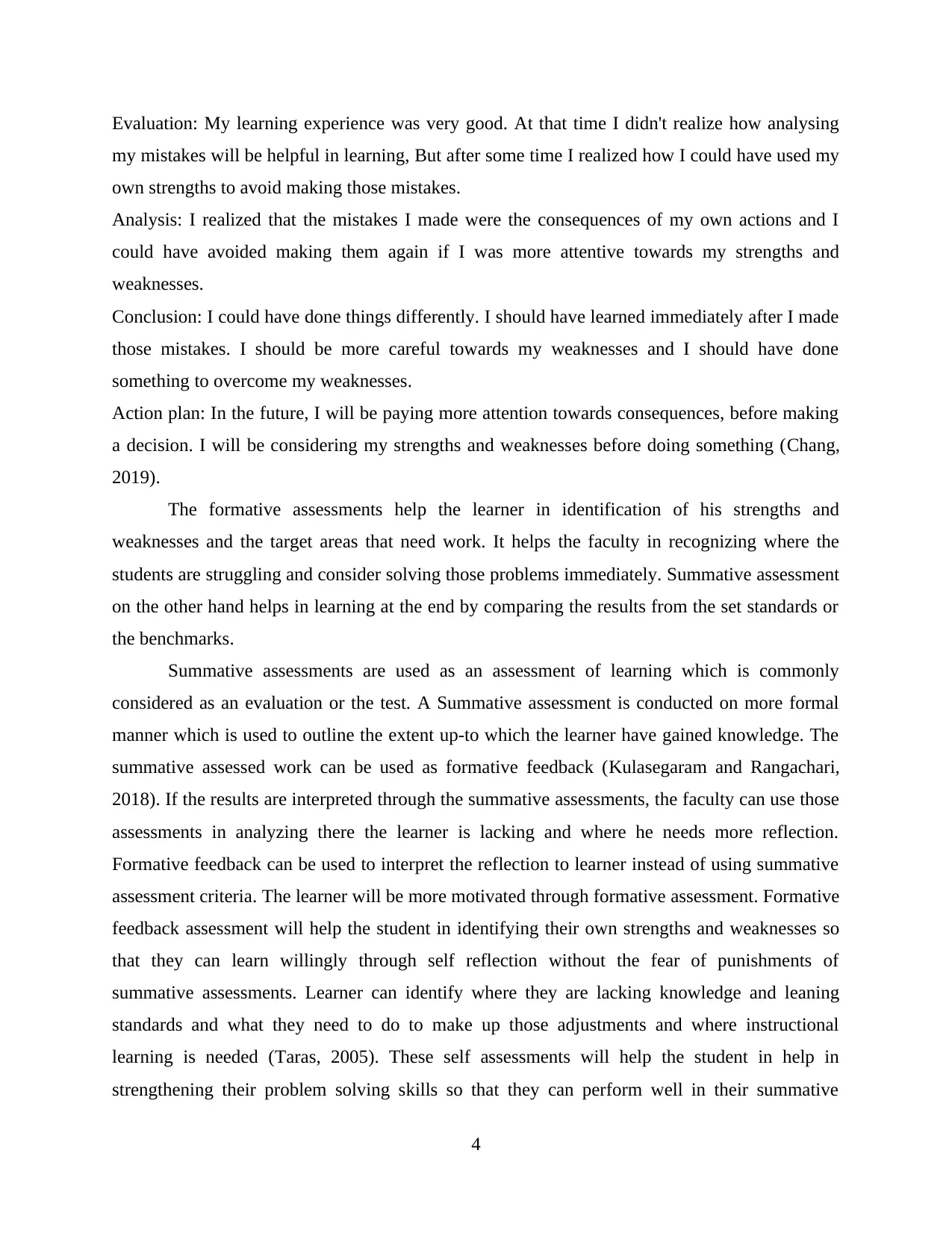
Evaluation: My learning experience was very good. At that time I didn't realize how analysing
my mistakes will be helpful in learning, But after some time I realized how I could have used my
own strengths to avoid making those mistakes.
Analysis: I realized that the mistakes I made were the consequences of my own actions and I
could have avoided making them again if I was more attentive towards my strengths and
weaknesses.
Conclusion: I could have done things differently. I should have learned immediately after I made
those mistakes. I should be more careful towards my weaknesses and I should have done
something to overcome my weaknesses.
Action plan: In the future, I will be paying more attention towards consequences, before making
a decision. I will be considering my strengths and weaknesses before doing something (Chang,
2019).
The formative assessments help the learner in identification of his strengths and
weaknesses and the target areas that need work. It helps the faculty in recognizing where the
students are struggling and consider solving those problems immediately. Summative assessment
on the other hand helps in learning at the end by comparing the results from the set standards or
the benchmarks.
Summative assessments are used as an assessment of learning which is commonly
considered as an evaluation or the test. A Summative assessment is conducted on more formal
manner which is used to outline the extent up-to which the learner have gained knowledge. The
summative assessed work can be used as formative feedback (Kulasegaram and Rangachari,
2018). If the results are interpreted through the summative assessments, the faculty can use those
assessments in analyzing there the learner is lacking and where he needs more reflection.
Formative feedback can be used to interpret the reflection to learner instead of using summative
assessment criteria. The learner will be more motivated through formative assessment. Formative
feedback assessment will help the student in identifying their own strengths and weaknesses so
that they can learn willingly through self reflection without the fear of punishments of
summative assessments. Learner can identify where they are lacking knowledge and leaning
standards and what they need to do to make up those adjustments and where instructional
learning is needed (Taras, 2005). These self assessments will help the student in help in
strengthening their problem solving skills so that they can perform well in their summative
4
my mistakes will be helpful in learning, But after some time I realized how I could have used my
own strengths to avoid making those mistakes.
Analysis: I realized that the mistakes I made were the consequences of my own actions and I
could have avoided making them again if I was more attentive towards my strengths and
weaknesses.
Conclusion: I could have done things differently. I should have learned immediately after I made
those mistakes. I should be more careful towards my weaknesses and I should have done
something to overcome my weaknesses.
Action plan: In the future, I will be paying more attention towards consequences, before making
a decision. I will be considering my strengths and weaknesses before doing something (Chang,
2019).
The formative assessments help the learner in identification of his strengths and
weaknesses and the target areas that need work. It helps the faculty in recognizing where the
students are struggling and consider solving those problems immediately. Summative assessment
on the other hand helps in learning at the end by comparing the results from the set standards or
the benchmarks.
Summative assessments are used as an assessment of learning which is commonly
considered as an evaluation or the test. A Summative assessment is conducted on more formal
manner which is used to outline the extent up-to which the learner have gained knowledge. The
summative assessed work can be used as formative feedback (Kulasegaram and Rangachari,
2018). If the results are interpreted through the summative assessments, the faculty can use those
assessments in analyzing there the learner is lacking and where he needs more reflection.
Formative feedback can be used to interpret the reflection to learner instead of using summative
assessment criteria. The learner will be more motivated through formative assessment. Formative
feedback assessment will help the student in identifying their own strengths and weaknesses so
that they can learn willingly through self reflection without the fear of punishments of
summative assessments. Learner can identify where they are lacking knowledge and leaning
standards and what they need to do to make up those adjustments and where instructional
learning is needed (Taras, 2005). These self assessments will help the student in help in
strengthening their problem solving skills so that they can perform well in their summative
4
Paraphrase This Document
Need a fresh take? Get an instant paraphrase of this document with our AI Paraphraser
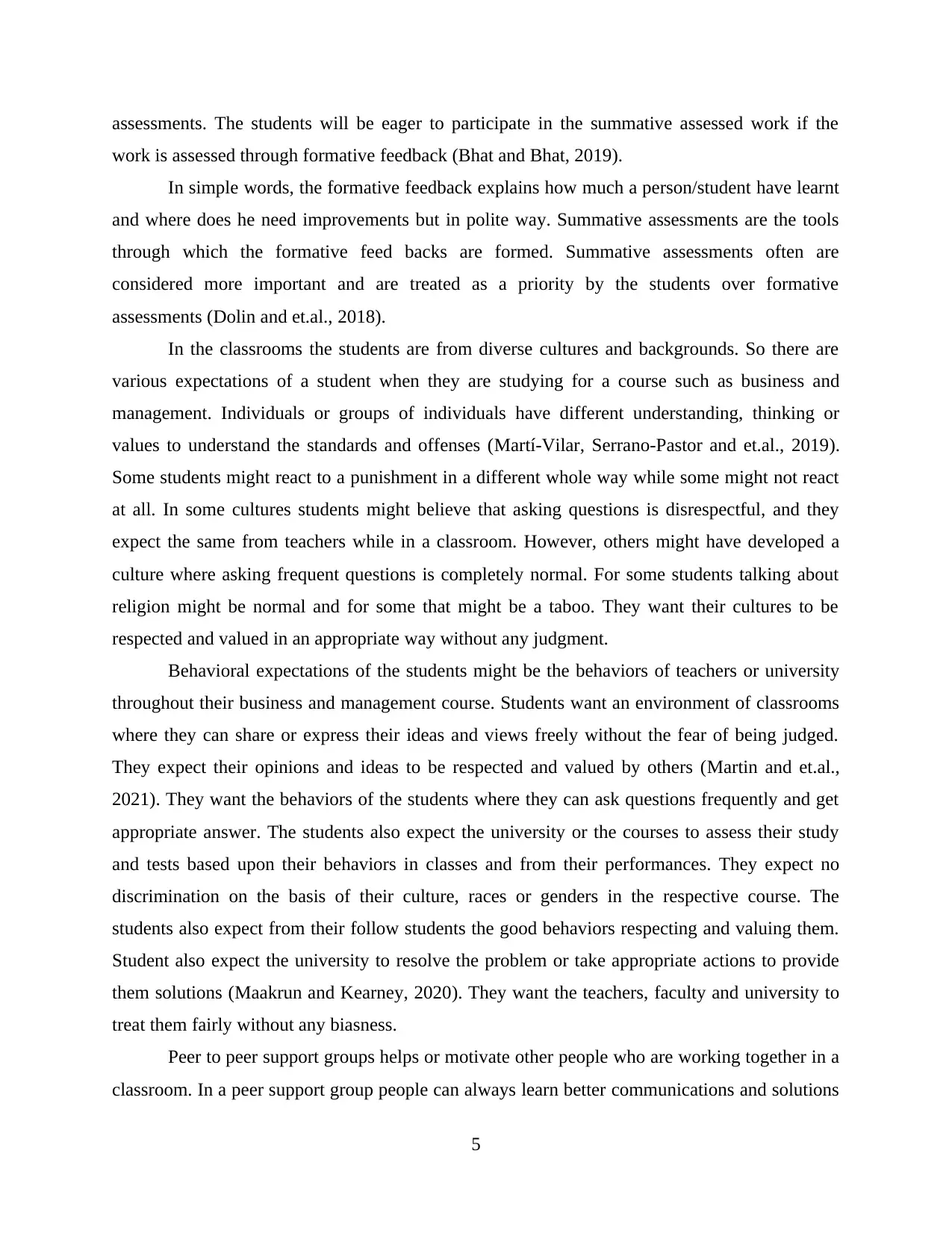
assessments. The students will be eager to participate in the summative assessed work if the
work is assessed through formative feedback (Bhat and Bhat, 2019).
In simple words, the formative feedback explains how much a person/student have learnt
and where does he need improvements but in polite way. Summative assessments are the tools
through which the formative feed backs are formed. Summative assessments often are
considered more important and are treated as a priority by the students over formative
assessments (Dolin and et.al., 2018).
In the classrooms the students are from diverse cultures and backgrounds. So there are
various expectations of a student when they are studying for a course such as business and
management. Individuals or groups of individuals have different understanding, thinking or
values to understand the standards and offenses (Martí-Vilar, Serrano-Pastor and et.al., 2019).
Some students might react to a punishment in a different whole way while some might not react
at all. In some cultures students might believe that asking questions is disrespectful, and they
expect the same from teachers while in a classroom. However, others might have developed a
culture where asking frequent questions is completely normal. For some students talking about
religion might be normal and for some that might be a taboo. They want their cultures to be
respected and valued in an appropriate way without any judgment.
Behavioral expectations of the students might be the behaviors of teachers or university
throughout their business and management course. Students want an environment of classrooms
where they can share or express their ideas and views freely without the fear of being judged.
They expect their opinions and ideas to be respected and valued by others (Martin and et.al.,
2021). They want the behaviors of the students where they can ask questions frequently and get
appropriate answer. The students also expect the university or the courses to assess their study
and tests based upon their behaviors in classes and from their performances. They expect no
discrimination on the basis of their culture, races or genders in the respective course. The
students also expect from their follow students the good behaviors respecting and valuing them.
Student also expect the university to resolve the problem or take appropriate actions to provide
them solutions (Maakrun and Kearney, 2020). They want the teachers, faculty and university to
treat them fairly without any biasness.
Peer to peer support groups helps or motivate other people who are working together in a
classroom. In a peer support group people can always learn better communications and solutions
5
work is assessed through formative feedback (Bhat and Bhat, 2019).
In simple words, the formative feedback explains how much a person/student have learnt
and where does he need improvements but in polite way. Summative assessments are the tools
through which the formative feed backs are formed. Summative assessments often are
considered more important and are treated as a priority by the students over formative
assessments (Dolin and et.al., 2018).
In the classrooms the students are from diverse cultures and backgrounds. So there are
various expectations of a student when they are studying for a course such as business and
management. Individuals or groups of individuals have different understanding, thinking or
values to understand the standards and offenses (Martí-Vilar, Serrano-Pastor and et.al., 2019).
Some students might react to a punishment in a different whole way while some might not react
at all. In some cultures students might believe that asking questions is disrespectful, and they
expect the same from teachers while in a classroom. However, others might have developed a
culture where asking frequent questions is completely normal. For some students talking about
religion might be normal and for some that might be a taboo. They want their cultures to be
respected and valued in an appropriate way without any judgment.
Behavioral expectations of the students might be the behaviors of teachers or university
throughout their business and management course. Students want an environment of classrooms
where they can share or express their ideas and views freely without the fear of being judged.
They expect their opinions and ideas to be respected and valued by others (Martin and et.al.,
2021). They want the behaviors of the students where they can ask questions frequently and get
appropriate answer. The students also expect the university or the courses to assess their study
and tests based upon their behaviors in classes and from their performances. They expect no
discrimination on the basis of their culture, races or genders in the respective course. The
students also expect from their follow students the good behaviors respecting and valuing them.
Student also expect the university to resolve the problem or take appropriate actions to provide
them solutions (Maakrun and Kearney, 2020). They want the teachers, faculty and university to
treat them fairly without any biasness.
Peer to peer support groups helps or motivate other people who are working together in a
classroom. In a peer support group people can always learn better communications and solutions
5
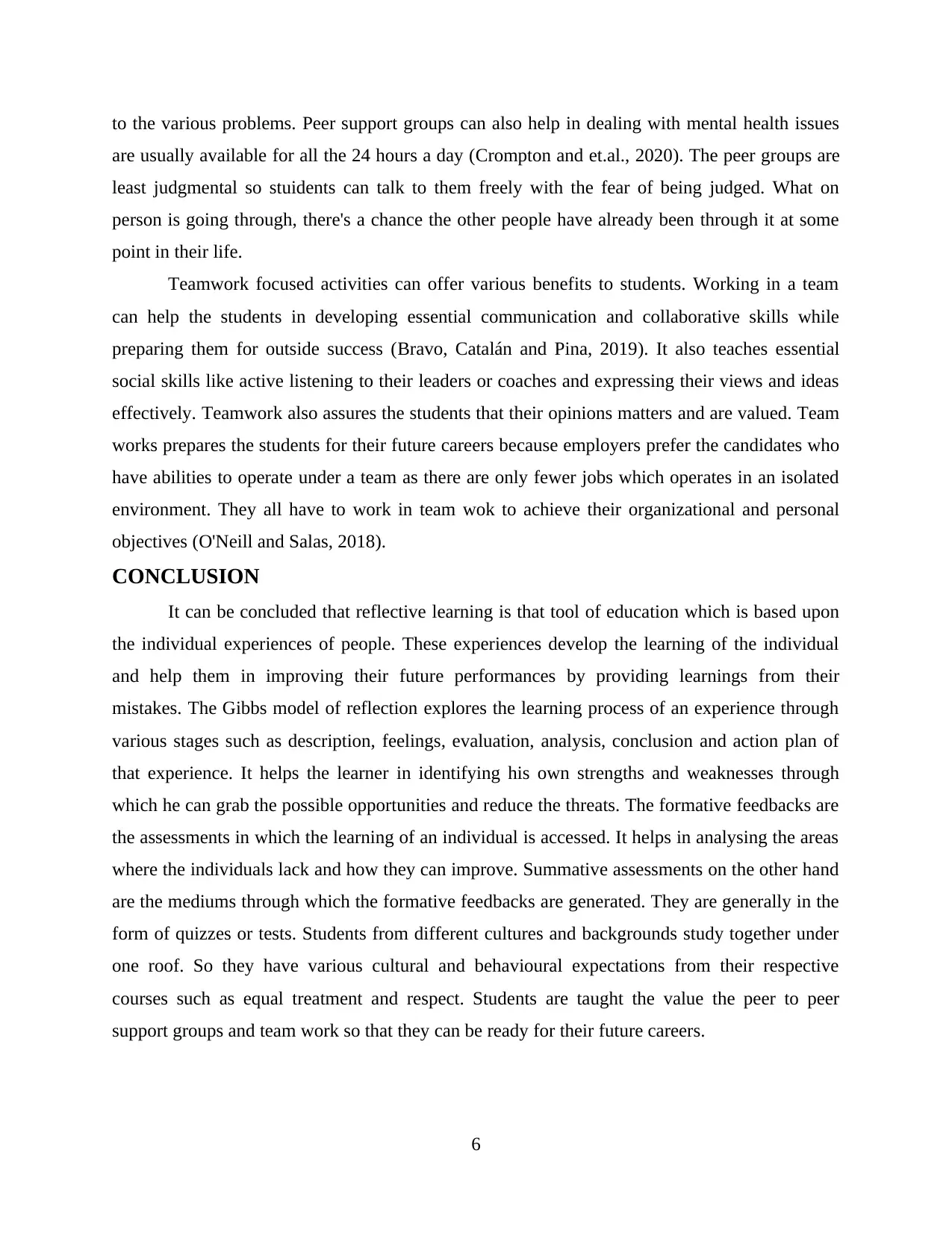
to the various problems. Peer support groups can also help in dealing with mental health issues
are usually available for all the 24 hours a day (Crompton and et.al., 2020). The peer groups are
least judgmental so stuidents can talk to them freely with the fear of being judged. What on
person is going through, there's a chance the other people have already been through it at some
point in their life.
Teamwork focused activities can offer various benefits to students. Working in a team
can help the students in developing essential communication and collaborative skills while
preparing them for outside success (Bravo, Catalán and Pina, 2019). It also teaches essential
social skills like active listening to their leaders or coaches and expressing their views and ideas
effectively. Teamwork also assures the students that their opinions matters and are valued. Team
works prepares the students for their future careers because employers prefer the candidates who
have abilities to operate under a team as there are only fewer jobs which operates in an isolated
environment. They all have to work in team wok to achieve their organizational and personal
objectives (O'Neill and Salas, 2018).
CONCLUSION
It can be concluded that reflective learning is that tool of education which is based upon
the individual experiences of people. These experiences develop the learning of the individual
and help them in improving their future performances by providing learnings from their
mistakes. The Gibbs model of reflection explores the learning process of an experience through
various stages such as description, feelings, evaluation, analysis, conclusion and action plan of
that experience. It helps the learner in identifying his own strengths and weaknesses through
which he can grab the possible opportunities and reduce the threats. The formative feedbacks are
the assessments in which the learning of an individual is accessed. It helps in analysing the areas
where the individuals lack and how they can improve. Summative assessments on the other hand
are the mediums through which the formative feedbacks are generated. They are generally in the
form of quizzes or tests. Students from different cultures and backgrounds study together under
one roof. So they have various cultural and behavioural expectations from their respective
courses such as equal treatment and respect. Students are taught the value the peer to peer
support groups and team work so that they can be ready for their future careers.
6
are usually available for all the 24 hours a day (Crompton and et.al., 2020). The peer groups are
least judgmental so stuidents can talk to them freely with the fear of being judged. What on
person is going through, there's a chance the other people have already been through it at some
point in their life.
Teamwork focused activities can offer various benefits to students. Working in a team
can help the students in developing essential communication and collaborative skills while
preparing them for outside success (Bravo, Catalán and Pina, 2019). It also teaches essential
social skills like active listening to their leaders or coaches and expressing their views and ideas
effectively. Teamwork also assures the students that their opinions matters and are valued. Team
works prepares the students for their future careers because employers prefer the candidates who
have abilities to operate under a team as there are only fewer jobs which operates in an isolated
environment. They all have to work in team wok to achieve their organizational and personal
objectives (O'Neill and Salas, 2018).
CONCLUSION
It can be concluded that reflective learning is that tool of education which is based upon
the individual experiences of people. These experiences develop the learning of the individual
and help them in improving their future performances by providing learnings from their
mistakes. The Gibbs model of reflection explores the learning process of an experience through
various stages such as description, feelings, evaluation, analysis, conclusion and action plan of
that experience. It helps the learner in identifying his own strengths and weaknesses through
which he can grab the possible opportunities and reduce the threats. The formative feedbacks are
the assessments in which the learning of an individual is accessed. It helps in analysing the areas
where the individuals lack and how they can improve. Summative assessments on the other hand
are the mediums through which the formative feedbacks are generated. They are generally in the
form of quizzes or tests. Students from different cultures and backgrounds study together under
one roof. So they have various cultural and behavioural expectations from their respective
courses such as equal treatment and respect. Students are taught the value the peer to peer
support groups and team work so that they can be ready for their future careers.
6
⊘ This is a preview!⊘
Do you want full access?
Subscribe today to unlock all pages.

Trusted by 1+ million students worldwide
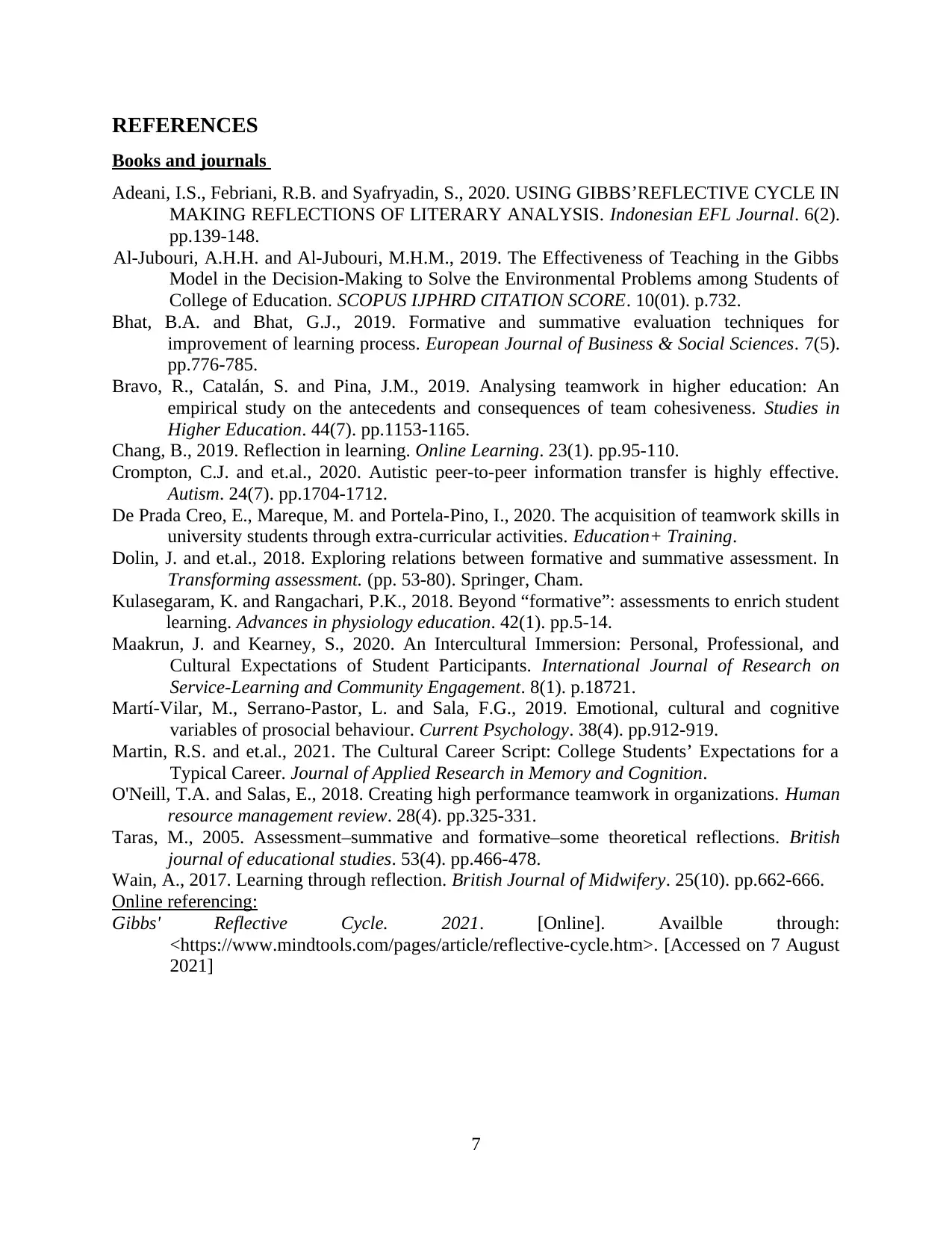
REFERENCES
Books and journals
Adeani, I.S., Febriani, R.B. and Syafryadin, S., 2020. USING GIBBS’REFLECTIVE CYCLE IN
MAKING REFLECTIONS OF LITERARY ANALYSIS. Indonesian EFL Journal. 6(2).
pp.139-148.
Al-Jubouri, A.H.H. and Al-Jubouri, M.H.M., 2019. The Effectiveness of Teaching in the Gibbs
Model in the Decision-Making to Solve the Environmental Problems among Students of
College of Education. SCOPUS IJPHRD CITATION SCORE. 10(01). p.732.
Bhat, B.A. and Bhat, G.J., 2019. Formative and summative evaluation techniques for
improvement of learning process. European Journal of Business & Social Sciences. 7(5).
pp.776-785.
Bravo, R., Catalán, S. and Pina, J.M., 2019. Analysing teamwork in higher education: An
empirical study on the antecedents and consequences of team cohesiveness. Studies in
Higher Education. 44(7). pp.1153-1165.
Chang, B., 2019. Reflection in learning. Online Learning. 23(1). pp.95-110.
Crompton, C.J. and et.al., 2020. Autistic peer-to-peer information transfer is highly effective.
Autism. 24(7). pp.1704-1712.
De Prada Creo, E., Mareque, M. and Portela-Pino, I., 2020. The acquisition of teamwork skills in
university students through extra-curricular activities. Education+ Training.
Dolin, J. and et.al., 2018. Exploring relations between formative and summative assessment. In
Transforming assessment. (pp. 53-80). Springer, Cham.
Kulasegaram, K. and Rangachari, P.K., 2018. Beyond “formative”: assessments to enrich student
learning. Advances in physiology education. 42(1). pp.5-14.
Maakrun, J. and Kearney, S., 2020. An Intercultural Immersion: Personal, Professional, and
Cultural Expectations of Student Participants. International Journal of Research on
Service-Learning and Community Engagement. 8(1). p.18721.
Martí-Vilar, M., Serrano-Pastor, L. and Sala, F.G., 2019. Emotional, cultural and cognitive
variables of prosocial behaviour. Current Psychology. 38(4). pp.912-919.
Martin, R.S. and et.al., 2021. The Cultural Career Script: College Students’ Expectations for a
Typical Career. Journal of Applied Research in Memory and Cognition.
O'Neill, T.A. and Salas, E., 2018. Creating high performance teamwork in organizations. Human
resource management review. 28(4). pp.325-331.
Taras, M., 2005. Assessment–summative and formative–some theoretical reflections. British
journal of educational studies. 53(4). pp.466-478.
Wain, A., 2017. Learning through reflection. British Journal of Midwifery. 25(10). pp.662-666.
Online referencing:
Gibbs' Reflective Cycle. 2021. [Online]. Availble through:
<https://www.mindtools.com/pages/article/reflective-cycle.htm>. [Accessed on 7 August
2021]
7
Books and journals
Adeani, I.S., Febriani, R.B. and Syafryadin, S., 2020. USING GIBBS’REFLECTIVE CYCLE IN
MAKING REFLECTIONS OF LITERARY ANALYSIS. Indonesian EFL Journal. 6(2).
pp.139-148.
Al-Jubouri, A.H.H. and Al-Jubouri, M.H.M., 2019. The Effectiveness of Teaching in the Gibbs
Model in the Decision-Making to Solve the Environmental Problems among Students of
College of Education. SCOPUS IJPHRD CITATION SCORE. 10(01). p.732.
Bhat, B.A. and Bhat, G.J., 2019. Formative and summative evaluation techniques for
improvement of learning process. European Journal of Business & Social Sciences. 7(5).
pp.776-785.
Bravo, R., Catalán, S. and Pina, J.M., 2019. Analysing teamwork in higher education: An
empirical study on the antecedents and consequences of team cohesiveness. Studies in
Higher Education. 44(7). pp.1153-1165.
Chang, B., 2019. Reflection in learning. Online Learning. 23(1). pp.95-110.
Crompton, C.J. and et.al., 2020. Autistic peer-to-peer information transfer is highly effective.
Autism. 24(7). pp.1704-1712.
De Prada Creo, E., Mareque, M. and Portela-Pino, I., 2020. The acquisition of teamwork skills in
university students through extra-curricular activities. Education+ Training.
Dolin, J. and et.al., 2018. Exploring relations between formative and summative assessment. In
Transforming assessment. (pp. 53-80). Springer, Cham.
Kulasegaram, K. and Rangachari, P.K., 2018. Beyond “formative”: assessments to enrich student
learning. Advances in physiology education. 42(1). pp.5-14.
Maakrun, J. and Kearney, S., 2020. An Intercultural Immersion: Personal, Professional, and
Cultural Expectations of Student Participants. International Journal of Research on
Service-Learning and Community Engagement. 8(1). p.18721.
Martí-Vilar, M., Serrano-Pastor, L. and Sala, F.G., 2019. Emotional, cultural and cognitive
variables of prosocial behaviour. Current Psychology. 38(4). pp.912-919.
Martin, R.S. and et.al., 2021. The Cultural Career Script: College Students’ Expectations for a
Typical Career. Journal of Applied Research in Memory and Cognition.
O'Neill, T.A. and Salas, E., 2018. Creating high performance teamwork in organizations. Human
resource management review. 28(4). pp.325-331.
Taras, M., 2005. Assessment–summative and formative–some theoretical reflections. British
journal of educational studies. 53(4). pp.466-478.
Wain, A., 2017. Learning through reflection. British Journal of Midwifery. 25(10). pp.662-666.
Online referencing:
Gibbs' Reflective Cycle. 2021. [Online]. Availble through:
<https://www.mindtools.com/pages/article/reflective-cycle.htm>. [Accessed on 7 August
2021]
7
1 out of 7
Related Documents
Your All-in-One AI-Powered Toolkit for Academic Success.
+13062052269
info@desklib.com
Available 24*7 on WhatsApp / Email
![[object Object]](/_next/static/media/star-bottom.7253800d.svg)
Unlock your academic potential
Copyright © 2020–2026 A2Z Services. All Rights Reserved. Developed and managed by ZUCOL.



